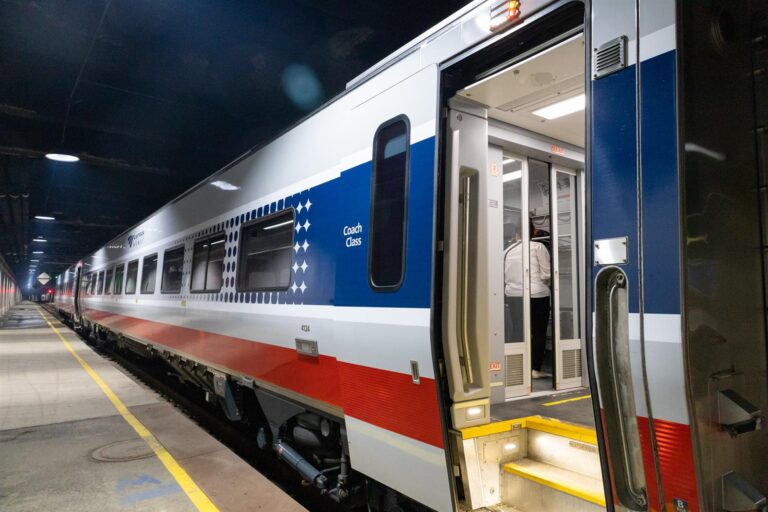CHICAGO — A trip from St. Louis to Chicago via Amtrak’s Lincoln Service will be about 15 minutes quicker starting this week due to track upgrades that allow for increased speeds.
The Amtrak line ran its first 110 mph service on Monday, up from 90 mph previously, which would make the one-way trip less than five hours long. The trip is now a full 30 minutes quicker than when the service ran at 79 mph when the project began in 2010.
The faster speed doesn’t meet the federal definition of high-speed rail – 125 mph – but the new Lincoln Service is faster than most other Amtrak trains. Less than half of Amtrak trains pass 100 mph, according to a March Amtrak report.
The speed upgrade is part of a broader $1.96 billion infrastructure project aimed at upgrading passenger rail service in Illinois. The funds mostly came from the federal American Recovery and Reinvestment Act, a 2009 stimulus package passed in response to the Great Recession. Around $300 million in funding for the project came from a mix of state and non-federal sources, according to the governor’s office.

Ray Lang, Amtrak’s vice president of state-supported services, said he believes the upgrades to route speed will help the company make rail travel more appealing downstate.
“We really think that now we’ll really begin to penetrate that market in a meaningful way south of Springfield and really begin to compete with the aviation industry between St. Louis and Chicago,” Lang said.
In fiscal year 2022, the Lincoln Service route had a ridership of 476,000, up 82 percent from 261,000 the previous year, which included several months in late 2020 and 2021 when the COVID-19 pandemic was still disrupting daily travel. Despite the growth, ridership has yet to surpass pre-pandemic levels. In FY 2019, the route saw about 628,000 trips, according to Amtrak data.

Local, state and federal officials celebrated the infrastructure investment at Chicago’s Union Station on Monday. Gov. JB Pritzker, Cook County Board President Toni Preckwinkle, U.S. Sen. Dick Durbin and former U.S. Secretary of Transportation Ray LaHood were on hand for the news conference, alongside others from Illinois’ congressional delegation, representatives of federal transit agencies and Union Pacific Railroad.
“Our railway is just a microcosm of the monumental collaboration of the federal government, the state of Illinois and local governments to modernize our infrastructure,” Pritzker said.
In addition to the higher speed service, the infrastructure project also included major upgrades at rail crossings and new stations in Dwight, Pontiac, Carlinville and Alton, as well as upgrades to the Lincoln, Normal and Springfield stations.
Rail passengers will also see new railcars on the Lincoln Service route and several other routes throughout the Midwest, including the Chicago-to-Carbondale Illini/Saluki route and the Chicago-to-Quincy Carl Sandburg/Illinois Zephyr route.
The upgraded passenger cars will be rolled out by the end of August, with updated cafe cars slated for 2024, according to Jennifer Bastian, the Illinois Department of Transportation official who managed the passenger car project.

The new cars, which cost about $3 million each, are engineered to minimize noise and increase accessibility. These include measures to increase compliance with the Americans with Disabilities Act, such as wider and more stable walkways between cars, wheelchair lifts and seat designs to facilitate easier wheelchair transfers.
The U.S. Department of Justice and Amtrak signed a settlement agreement in 2020 to upgrade stations throughout the country to comply with the ADA.
According to Amtrak’s most recent report on ADA compliance from April 2022, the rail service had completed 373 station construction and design projects, with 167 in progress and 364 remaining. Amtrak is also updating passenger display boards and boarding technology as part of its ADA settlement agreement with the federal Department of Justice in 2020. Amtrak is also updating passenger display boards and boarding technology as part of the ADA settlement agreement.


